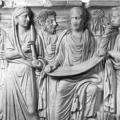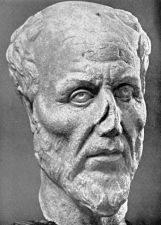88 - Simplicity Itself: Plotinus on the One and Intellect
Posted on
Plotinus posits an absolutely transcendent first principle, the One. What is it (or isn’t it), and how does it relate to Intellect?
Themes:
Further Reading
• H.A. Armstrong, “The Background of the Doctrine ‘that the Intelligibles are not Outside the Intellect,’” in Les Sources de Plotin (Geneva: 1960), 393-413.
• J.R. Bussanich, The One and its Relation to Intellect in Plotinus (Leiden: 1988).
• E.K. Emilsson, Plotinus on Intellect (Oxford: 2007).
• S. Slaveva-Griffin, Plotinus on Number (Oxford: 2009).







Comments
Sunflowers
Thanks for the as-always wonderful podcast!
I thought I'd submit one unimportant quibble into the record. We can actually be confident that Plotinus did NOT contemplate the sunflower as he wrote about the unity of plants. The sunflower is a New World crop and didn't arrive in Europe until European exploration of the Americas in the 1500s.
In reply to Sunflowers by Adam
Sunflowers
Wow, I didn't know that -- interesting, thanks! So I should have gone with the potato then. (Just kidding.)
Plotinus - mystic philosopher
Thank you for illuminating podcasts. I am especially fond of the following words from Plotinus (mystic-philosopher)from his writing On Beauty "This is not a journey for the feet; the feet bring us only from land to land; nor need you think of coach or ship to carry you away; all this order of things you must set aside and refuse to see: you must close the eyes and call instead upon another vision which is to be waked within you, a vision, the birthright of all, which few turn to see." www.spiritualhuman.wordpress.com
One of the most difficult
One of the most difficult episodes... needed to listen several times...
In reply to One of the most difficult by Xaratustrah
Difficulty
Yes, this is a hard topic - actually the question of how unity produces multiplicity is probably the trickiest issue in Neoplatonism and gave Plotinus and later (also earlier) Platonists a lot of trouble. Thanks for sticking with the episode though!
In reply to Difficulty by Peter Adamson
The Plotinian One and causation
Hello,
I would be eager to engage you and others on this question. Is there the opportunity for some online dialogue about it?
In reply to The Plotinian One and causation by Hello Peter
The One
Well, beyond leaving a comment here I haven't set up anything for that. I guess you could for instance set up a Reddit thread on Plotinus and we could announce it here (I could put a link to it on Twitter too) and maybe you'd get some takers.
Finally
I am heartened to discover finally a philosopher who takes a definite stand on the perenniel question, "Which came first the egg, or το εν"
*rimshot*
In reply to Finally by Tom
To hen
I was going to make that yolk, but chickened out.
(Semi) seriously though, the chicken-egg question comes up for real in episode 252, where a medieval thinker brings it up in the context of arguments about the eternity of the world!
emanation and the forms
Some questions:
Intellect and the forms are emantions from the One, directly or indirectly. So emanation is not the same kind of relation as that between forms and individual things, or forms and concepts. Are those two relations supposed to be special kinds of emanations, or some other kind of relation?
Do we get some kind of Third Man problem with emanation?
In reply to emanation and the forms by Steve
Emanation
Actually I guess that in Plotinus, the relationship between a Form and its instance (like the Form of Giraffe and a particular, physical giraffe) is indeed very much like the relation between the One and the Intellect: in both cases the higher cause automatically gives rise to an image, which fails to measure up to the perfection of the cause. There are some complexities with the One's production of Intellect that don't apply to lower kinds of emanation, since he has to explain how something completely simple can give rise to something that has multiplicity. But the basic causal framework is the same.
As to the third man problem, he doesn't address this directly - Proclus does, in his commentary on the Parmenides. I think the way Plotinus would get out of it is by saying that the Form in Intellect gives itself the relevant nature, so for instance it is the Form of Giraffe that makes it the Form of Giraffe and not something else. Whereas a physical giraffe does need to get its nature from an extrinsic cause, namely the Form. Hence the regress is stopped by something that is responsible for its own character.
Nous Question
Thanks for these awesome videos Peter Adamson.
I was wondering a bit about the nous. So the Nous is bipartite because it thinks about itself (such self-reflexivity implies duality) AND it is potentially infinite multiplicity because there are a potentially infinite number of Forms it contemplates; so I'm confused, is the nous duality or multiplicity? If both, as it seems, is the Nous' duality ontologically prior to its multiplicity (which makes a kind of sense to me)? If so, does this make the Nous, qua-duality, equivalent to the Dyad, but as a unified substance as the Monad (i.e, as a self-thinking entity)? And I've heard recently about the notion of Intelligible Matter in relation to Plotinus (and Aristotle), is this the idea that the Forms are limited to being distinct from other Forms by an intelligible substratum---by intelligiability, that is, by the Nous itself, as a principle of limitation the way physical matter limits Form in concrete particulars?
I guess what I'm asking, if you'd be so kind Peter Adamson, is if you could explain the various aspects of the Nous: it is one thing (a self-thinking thing), yet dual, yet potentially infinite in multiplicity; how does all this fit together? And how do the notions of the Monad, Dyad, and Intelligible Matter fit into all this? Also, does the thinking Nous conceptually think or define in a bipartite fashion in the way humans do by identifying a Form's genus and specific difference---eg., "Man is a rational (principle 1) animal (principle 2)", contains 2 elements: genus and specific difference.
I ask because I am genuinely attracted to Middle- and Neo-platonism as philosophical systems and as someone who will be tasked with teaching on Platonism as a biblical scholar in the making, I want to be able to teach it in the most lucid and compelling way possible.
PS--your comments made it sound like the Nous only has concepts that have actually been concretized in the material world, does the Nous not contemplate coherent concepts (like unicorns) that are in fact intelligible yet not materially instantiated? If so, why?
Thanks again for this awesome series!!
Episode 88 not working anymore ?
Don’t know whether I am aloud to ask this question here but episode 88 isn’t working for me. The first 87 were fine. And following the without any gaps line of character, I am stuck for now. Is anything wrong with episode 88 ?
In reply to Episode 88 not working anymore ? by Erik Holkers
Episode 88
Sorry you had trouble with this - sometimes the feed doesn't allow access to specific episodes but then the problem seems to fix itself, and I can listen to it here now. Are you still having the problem?
The One and you
The wonderful non-sectarian poet Kabir states it plainly,
"If you know the One,
Then know that you know [the] all;
If you know not the One,
Then all your knowledge
Is nothing but fraud."
Or, we could go with this passage from Trappist monk and spiritual writer Thomas Merton in New Seeds of Contemplation:
"A man [woman] could easily lose his [her] way in a forest of technical details which concern a professional theologian [or professor of religion]. But God gives true [seekers] a hunger born of humility, which cannot be satisfied with formulas, [statistics], and arguments, and which looks for something closer to God than analogy [and theory] can bring you (148-149)."
How about the revered Islamic teacher Al-Ghazali who wrote about how there are different types of seekers. He puts the “Theologians [of] intellectual speculation” and the “Philosophers, who regard themselves as the exponents of logic and demonstration” at low levels of spiritual understanding (Watt 78). The most advanced class of seekers for Al-Ghazali is the mystics, of whom he writes: “I learnt with certainty that it is above all the mystics who walk on the road of God” (Watt 60). He further states: “Indeed, were the intellect of the intellectuals and the learning of the learned and the scholarship of the scholars, who are versed in the profundities of revealed truth, brought together in the attempt to improve the life and character of the mystics, they would find no way of doing so” (Watt 60). There is even a saying about scholars that Al-Ghazali attributes to The Prophet Mohammed, which states: “the most severe punishment on the day of Resurrection is that of the scholar to whom God gave no benefit from his [her] knowledge” (Watt 87-88).
But let's keep it real and just say, "Who cares what any of you think?" Your thinking and your questions and your theories can never enter The One. But your ego loves to think and question and theorize. That's what keeps it alive and ruling your separate lives.
Peace,
JTW
Add new comment